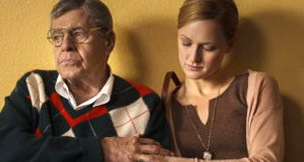By Harry Haun

There are those who still remember that standing ovation, and they still insist it did clock in at close to 20 minutes. Daniel Noah, who directed the film and was there, has his doubts, but even he concedes, "It was long-God! It was very long! There was a lot of love for the film and for Jerry. It was very, very well-received-in the room."
The "room" was actually an outdoor-beach screening area at the 2013 Cannes Film Festival, and the French, who are notoriously nuts for the original Nutty Professor, couldn't stop cheering and screaming, "Zh-erry, we love you!" As one observer of the hedonistic hero-worship noted, Jerry Lewis may be the only person in the universe to get away with calling Cannes' powerful festival director, Thierry Frémaux, a putz.
Even those who slept pretty soundly during the unreeling managed to rally and join in the joyful tumult, according to one bitchy critic, but the notices that followed this showing were far less kind.
"It was one of the most difficult experiences of my life-to have this incredibly personal story premiere, unsuccessfully, on the world stage," Noah says in painful retrospect. "The whole thing was the stuff of anxiety dreams. It was hard. I got the wind knocked out of me. I think that we all did. It took a little while to get back up."
The object lesson to be found in Max Rose, the picture in question, comes from the classic haste-makes-waste scenario. "We shot the film in 21 days in L.A.," Noah recalls, "starting it at the end of 2012 and breaking for the holidays, then coming back and finishing it at the beginning of 2013. Cannes had been tracking it and was very interested in showing it that May. It was an extremely tight timeline, but we felt we'd be fools not to accept the invitation. So Cannes saw what amounted to the first assembly. As you know, assemblies are very rough. It's hard to have an emotional experience with them, so they had to trust a little bit that we were going to be ready.
"Well, we weren't. Something I learned from this experience-and from other films that I've made as a producer over the past five years-is that there are certain films where you can drop the scenes exactly as they are written in the screenplay in the order they were written; then, you cut a scene here or there, nip and tuck, and basically it works as written. But there are others where you have to find the film in the editing room. Max Rose is very much one of those films. There's a certain breed of films in which the story exists almost entirely in the interpersonal dynamics-in the human behavior rather than more in the traditional plot-and those are, in my opinion, the most rewarding films. Ingmar Bergman's films are all about human behavior and interaction, but they're often difficult. They're subtle, nuanced. Max Rose is like that. There's not a lot of plot, so it took more time than we had to find."
Picking himself up and dusting off the corrosive sand of Cannes, Noah set out to find the film that got away. "There were also economic repercussions," the director pointed out. "We had to figure out financing while continuing to work on the film. But, over time, we pulled together. I don't know if I'll ever have a more intimate experience with a group of producers and financiers than I had on this film. These are people that I consider my friends for life. They really rallied and said, 'No, we're going to finish this thing and see it through and see it through correctly.'"
Finishing the film was the least of it. Finding a distributor was the most of it, requiring literally a few years before producers Lawrence Inglee and Garrett Kelleher finally reeled in Paladin, a distributing company adventurous enough to take a chance on a senior-citizen saga. Said Paladin prexy Mark Urman to IndieWire at the time: "It's a total misconception that an elder audience is not worth marketing a film to. This is a large audience, an eager audience and an audience that listens."
While Noah and his producers were in discussion with Paladin about how they were going to roll the film out, another event occurred that pushed the film into release.
Jerry Lewis turned 90 last March 16, and New York's Museum of Modern Art threw him a retrospective, including the second public showing of the three-year-old Max Rose.
How not to say no to that? "It was really just lucky timing that his 90th birthday was falling right when we were getting ready to premiere the film," Noah declares. "Mostly, we just thought of it as a nice birthday present to be able to give to him. We always knew we wanted to have a premiere in New York and a premiere in L.A., so the MoMA retrospective was the perfect opportunity to show the film, and in about a month it will premiere in L.A. at the American Cinematheque. It opens in New York for a week at Sunshine Cinema Sept. 2 and rolls out nationally the following week."
In addition to its 90-year-old main draw, Max Rose co-stars Dean Stockwell, 80; Claire Bloom, 85; Rance Howard, 87; Lee Weaver, 86; Mort Sahl, 89, and a few sprightly whippersnappers like Kerry Bishé, Illeana Douglas and Kevin Pollak.

